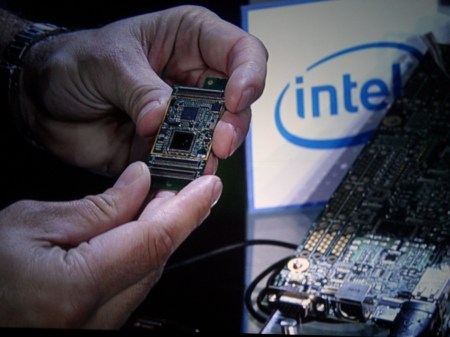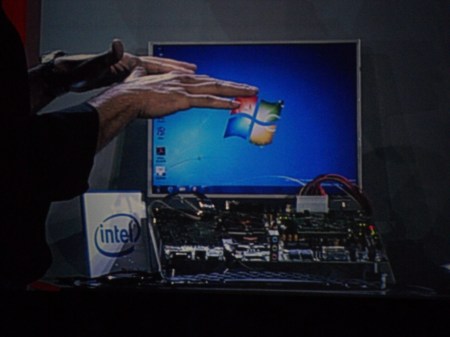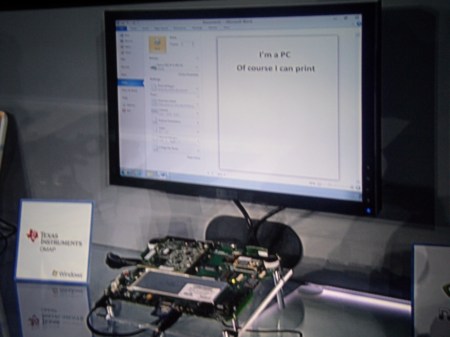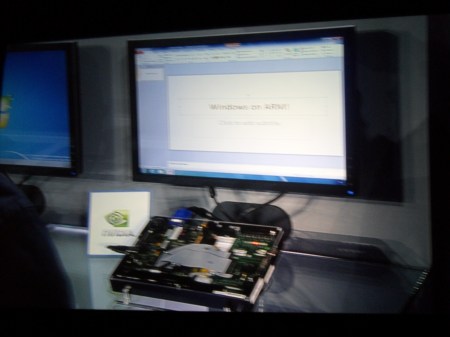 With the Pre-CES Keynote made by [Steve Ballmer], the announcement came that the next iteration of their operating system being available in SOC specific form. This will lead to windows being able to run a very diverse hardware set in a much more efficient manner than it does right now. Microsoft displayed 4 different versions of what the next generation prototypes are from 4 different manufacturers but there has been no work done yet on the GUI for SOC as [Ballmer] was very clear to mention that more than a couple of times. Some photos of the prototypes can be found after the break!
With the Pre-CES Keynote made by [Steve Ballmer], the announcement came that the next iteration of their operating system being available in SOC specific form. This will lead to windows being able to run a very diverse hardware set in a much more efficient manner than it does right now. Microsoft displayed 4 different versions of what the next generation prototypes are from 4 different manufacturers but there has been no work done yet on the GUI for SOC as [Ballmer] was very clear to mention that more than a couple of times. Some photos of the prototypes can be found after the break!
The picture below is Intel’s iteration of System on a Chip.

These next three photos are from Snapdragon, Texas Instruments OMAP and Nvidia’s Tegra Platform all using an ARM processor:


















@MrX
As previously stated, cheap-o-netbooks dont count! I want a real LAPTOP. >:(
I actually feel sorry for Microsoft. I’m no Linux fan but I have 3 OS’s on my laptop: Linux, Android and Windows 7.
I do most of my activities in Linux and sometimes I use Android or my daughter plays playstore games. I never use Windows. That’s not out of bias because I always preferred Windows. Now it just feels old and dated. I find the default file system extremely unpleasant. I am sure I can change it back to something more like the XP or 98 filesystem but I so seldom use Windows that I have never bothered. Times are changing. I am sure Microsoft will maintain its position in the business sector for a long time but for home users it is not a good product now.
@oak
ARM had anti-aliased fonts and vector-based drawing much better than Windows on x86 at the time (before 2000). The machine were called ‘RISC PC’ and did not run a bloated Microsoft OS so they had the time to do all those wonders.
@Jan D
I’ll take any sort of OS bashing with a grain of salt. But binning any form of trepidation and caution for the latest random marketing shift from a company that is hacker unfriendly, ethically questionable and not at the top of their game, as a form of bashing is not necessarily correct. It could be common sense. Either based on experience or ,and this could blow yours, an open mind.
For anyone who says ARM chips are not powerful enough to run a full version of windows 7 (or 8), they need to get their head out of the box that a lot of people seem to be living in.
I have quite happily been running windows 7 ultimate with full visual effects, 2 monitors, the whole lot – on a 1.8Ghz AMD Sempron with 1GB RAM. It is not slow either.
The new dual core ARM chips with a few GB of RAM will easily run most things a general computer user needs. I would love my computer to be fanless and take up a few square inches on the back of my monitor – I say bring on the windows ARM compatible OS.
@retep vosnul
I see, so because you spend time and work with it you hate it? I see now… And you also expect us hackers (thats right hackers) not to get excited over a new product such as the ARM compatable version of windows(!) because they are (in your opinion) “ethically questionable”
I must say you sir have done the community and intense disservice. Kindly refrain from ever approaching anything to do with hacking again, we don’t need narrow minded cunts like you about.
kool stuff xD
@3-R4Z0R
Who cares? Microsoft never cared about software portability. Just because the kernel and, as it looks like, other pieces of the operating system were migrated to ARM it doesn’t mean the operating system will suddenly become relevant in that arch. It is granted that .NET will help them a lot in software portability but that is just a niche market.
For example, remember when x86_64 appeared out there. Gentoo Linux was the first Linux distribution supporting that platform and a wide range of software that could benefit from it. Why did that happen so fast? The software was opensource and Gentoo builds software from source, people were free to fix and optimize it for x64 and eventually a lot of patches went upstream (software developers). This benefited other Linux distributions which very quickly started supporting x86_64. Eventually windows XP x64 came out and was a failure, most software developers were not interested.
A decade later, the Windows ecosystem is still migrating to x86_64..
Notice that migration of C apps from x86 to x64 is fairly easy, most of times just needing a check of pointer arithmetic.
Now do you really want me to believe Microsoft will succeed to push the windows ecosystem into ARM? How many years will that take? Isn’t Linux (and most all of its ecosystem) running in ARM? What about the iOS and Apple’s SDK, isn’t it a lot cleaner that Microsoft’s one?
@mowcius
You can sit and wait. It will take some years before you can purchase a Windows for ARM. Then wait more and more years before your useful windows apps start popping up with ARM support.
Why wait? Most of Linux software already runs on ARM, it isn’t the kind of software you are used too but you might like it.
@mowcius
Its a differnt architecture,
You cant compare them directly, ARM processors are not as powerful as standard x86 cpu’s at similar clockspeeds
:)
Nice, but will it blend? :D
@Jan D
Why does Microsoft have such a dominant market share when Linux can be downloaded for free? ..um maybe because of the monopoly they have over computers that ship with Windows already installed? The average personal computer user isn’t given a full range of OS choices when purchasing a computer, plain and simple.
I’ll settle for 1 OS 1 Framework. Java is going to die in a few years since the acquisition by Oracle. So .NET is dominating with its wide range of application support and Visual Studio.
I will prefer to develop something that can be used by more than 90% of tech gadget users rather than the negligible.
Dumb question, but with the AMD Fusion cpu/gpu hybrid chips on the way, would it be impossible to incorporate the ARM architecture into a part of the chip just to run the Windows GUI, but leave the rest of the processor to do application work?
@group
Let’s realize one thing. Microsoft believes they need to sell software to make money. Sadly this is the way the world works. If they need to invest in that process to further their business model, then perhaps this is a good thing. And when you consider that there are people who actually run a medium sized business for that reason, (I am one of them.) then it is still a good thing.
@cknopp
It doesn’t make any sense to have the GUI parts running on a separate processor really. Anything you need to make GUI work faster should be in the GPU… The thing is CPUs are fast enough now to do most of that 2D sort of stuff without breaking a sweat.
@Neckbeard No, you do not see. You don’t see at all. All you see is what resides in the small impenetrable bubble of your pompous opinions.
“I have done the hacker community a disservice” Are you a &^#*$#$ tool ? On crack ? Get off it man.
How would you, in you seemingly infinite wisdom, categorize boxing and labelling a large part of said community, ignoring valid arguments for their position just because it does not stoke with your limited world view and experience.
You’d call that a service ? you would, wouldn’t you ?
I’ll simply call you for what you are, a troll.
@MrX: I fully agree. Android SDK is also a lot better than M$’s SDK, if they ever will have one.
Wow very intense comments, But let us not forget that this new “windows” team has been making decent progress. let us look at xp and then 7, very comparable speeds (i try not to remember vista…). new features and relatively “minimal” bloat. btw how many people are “power users” ? tweaked 7 > tweaked xp and if 7 stock > vista*100. don’t get me wrong i’m no fan boy, i’ll gladly use anything and give realistic unbiased feedback.
AMD is leading the way with fusion, however passive cooling is unlikely vs. ARM, however with the performance trade off id go with fusion for laptops and ARM for tablets. Simply for graphical programs I’d go with 8 on a tablet otherwise Android/Linux based.
What i’ll be waiting for is a x86 replacement, as said above i’m aggregated that we’re still on x86. Honestly in a world where roughly every 6 months your components are outdated and a year old component can be considered obsolete, this makes no sense to me. This how ever may spark further innovation, thus i welcome Win*SOC lol.
Is this the end of “updates”?
he, is has everybody vergotten the transmeta crusoe cpu ? it had a 256-bit-wide VLIW core that ran x86 software at 1ghz. if arm or amd uses this tech in a dual core cpu with integrated gpu and then extends the instuction set to 512-bit-wide vliw core, any os would run like a bat out of hell.
@Jowie
ARM wouldn’t be able to use it, and hence not this at all, since virtually all SoC tech uses arm, but man that is an amazing processor!
A lot of useless fanboyism here. I would have maturity would finally come to HAD.
@david
i have only worked a few times on a transmeta cpu and it is the almost 10 year old technology that was used i am crazy about . this tech would enable a cpu to run x68,arm code or any other with no mods to the hardware.it would also enable the cpu to run at a lower speed because 32bit or 64bit code would be transcoded into for example 512bit making execution of code faster ,making it suitible for smartphones,smartbooks and netbooks. also with the multy core technology of today,such a cpu would be able to bast it predisessor out of the water.
But x86 sucks so much…:P
I would rather see a full on transition to ARM than smo super CPU with multiple support.
some*
Windows NT used to run on ARM, MIPS, PowerPC and Alpha. Microsoft customers on these platforms got burned (but Windows users don’t hold a grudge, ever).
This MS porting effort is shortsighted. The OS is nothing without apps and drivers. Windows apps and drivers are all closed source, like the OS. There’s just not going to be a lot of momentum outside of Intel… perhaps ARM will do OK, but you’ll see plenty of vendors ignore ARM for drivers.
It’s much easier for an open source OS to support “any” CPU platform. The chip vendors contribute kernel code and automated tests, and it all gets ported. You can still run an ancient 3dfx card on the latest kernel… on PowerPC or Intel. (The point isn’t that old stuff still works, but things stay working… lots of Vista owners had to buy new scanners and printers because the vendor chose to not update their drivers).